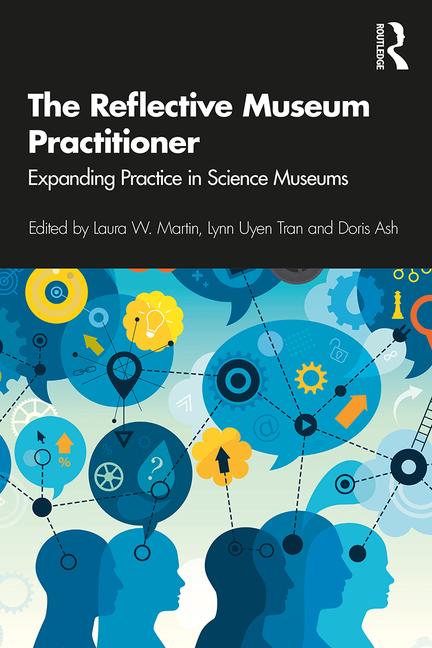A New Book Highlights How Six Science Museums Reflect on Practice
Laura Martin is a Senior Advisor for the Arizona Science Center. Photo courtesy of the Discovery Center Museum in Rockford, IL.
Hands-on activities, as opposed to thumbs-on, seem to be dwindling in our homes and schools. But our science centers still offer this type of interaction (although they also reach out through online services and tech-based exhibits). Interestingly, many technology-based experiences come out of cognitive science research, and their design is based on a deep understanding of perception and feedback processing.
 Science center staff are the key interpreters or mediators between a guest and an educational hands-on experience. Yet staff members–including front-line employees, scientists, docents, and exhibit designers–do not always have training in how people learn to enable them to facilitate learning more effectively. They also have little time to reflect on how to facilitate well.
Science center staff are the key interpreters or mediators between a guest and an educational hands-on experience. Yet staff members–including front-line employees, scientists, docents, and exhibit designers–do not always have training in how people learn to enable them to facilitate learning more effectively. They also have little time to reflect on how to facilitate well.
Six projects, reviewed in the recent volume The Reflective Museum Practitioner: Expanding Practice in Science Museums, edited by me, Lynn Tran, and Doris Ash, aim at helping interpreters review their practices, revise their approaches, and evaluate the outcomes of the adaptations. These are soft interventions that deal with interpersonal issues and cultural sensitivities. They have implications for museum administrators who do not prioritize staff development in their budgets and schedules. They respond to the variety of players and institutions.
The questions addressed by these projects deal with the following:
- Organizing and integrating reflection on practices by interpretive staff: Team Based Inquiry is a project that trained floor staff and others to review their programs and approaches. The project, which reached a large network of museums nationally, promotes a process that reflects an iterative inquiry cycle of action and leads to internalization of self-reflection. The central project team developed a series of reflective workshops and a model for training museum staff in many different working contexts.
- Developing frameworks for activities across institutions and departments: In a climate of accountability and evidence-based programs, Museums and After School: Principles, Data and Design describes a process in which museum staff, learning experts, and after-school program staff work together to identify the meaning of “informal inquiry” in after-school programs run by museums. The project used the observations and experiences of the participants to develop reflective tools and rubrics for identifying appropriate practices and design principles.
- Evaluating visitors’ engagement in activities and helping staff reflect on their own engagement: the Zoo and Aquarium Action Research Collaborative was designed to confront the lack of career ladders in informal science institutions, staff turnover, and the partitioning off of staff from decision-makers by engaging staff members’ professional curiosity through research. Staff researched questions about activities and visitors at six different institutions. The project took a co-constructive approach so that the staff felt empowered to design their own studies and develop expertise through research collaboration.
- Understanding developmental stages of learners: Reflecting on Practice has been engaging staff members in learning about their teaching practice at over 300 facilities. The project is a learning partner of the Association of Science and Technology Centers, Association of Zoos and Aquariums, and the National Association for Interpretation. Over the past 10 years, the project staff have been refining a model that helps museum professionals communicate with the public through extended, modular coursework on how people learn. The goal is to create communities of practice through shared language, habits of reflection, and traditions of continued professional learning.
- Appreciating the cultural diversity of audiences and the voice of interpreters: Researchers and educators at the Museum of Science and Industry in Tampa worked with diverse visitors to design and test a series of reflective professional development tools. The tools are aimed at helping museum educators engage with and co-construct interpretive strategies based on the concept of the zone of proximal development. Staff collaborated on ‘noticing’ the resources that visitors from non-dominant populations brought with them and then responded appropriately. They produced a library of videotaped “teachable moments,” as well as two guides for reflective practice, one for practitioners and one for mentors.
- Helping scientists interface with the public about their work: Portal to the Public is a program model that helps museum educators provide techniques, including reflective practice, to scientists and other professionals like artists who interact with museum visitors. Scientists engage in learning by doing, getting feedback from visitors, and reflecting on their own meaningful memories in informal settings. The approach is guided by constructivist theories, visitor identity work, and motivation research.
These are key areas to improving and advancing our practices with face-to-face learning. The projects are based on learning research and developmental insights. However, these techniques and approaches are not easily adapted to a busy, seven-days-a-week museum schedule. Investment in workplace learning is a management issue as much as a learning issue, which distinguishes it from many technology-based innovations.
Cultivating reflection among museum staff who mediate hands-on activities takes commitment from administrators, well-organized training sessions, staff who want to improve their effectiveness, and flexibility to accommodate the circumstances, resources, and goals of their specific science centers. Despite these challenges, the practice can provide important benefits to museum visitors.
I would like to thank the many project contributors, which include: Doris Ash, Marjorie Bequette, Bronwyn Bevan, Sarah Cohn, Catherine Halversen, James Kisiel, Elizabeth Kollmann, Judith Lombana, Vrylena Olney, Rae Ostman, Scott Pattison, Christine Reich, Andee Rubin, Meena Selvakumar, Lisa Trahan, Lynn Tran, Maia Werner-Avidon, and Tracey Wright.